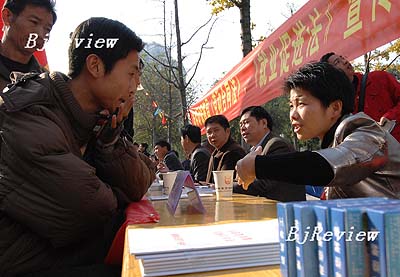|

After more than two years of deliberation and public comments, the Law of the People's Republic of China on Employment Contracts, or Employment Contract Law, has been ratified and will officially come into force on January 1, 2008. What does the new law imply for employers and employees?
The new law is a milestone in building an employment and social security system in China since the current Employment Law of China was enacted in 1994. It has been formulated to protect the lawful rights and interests of workers, develop harmonious and stable employment relationships and build a harmonious society. As the Employment Contract Law has direct bearing on the operation of business and the daily life of the public, its ratification has attracted widespread attention and had an impact on labor relations. In fact, debates on the law started long before its official publication. To some people, it reflects the balance of power between employers and employees.
Since its official publication in June, the Employment Contract Law has already made an impact and triggered controversial mass layoffs in several regions.
Blitz layoff in some well-known companies
At the end of September 2007, Chinese telecommunications equipment giant Huawei Technologies in Shenzhen ordered over 7,000 employees who had worked for the company for more than eight years to quit before January 1, 2008, the time when the new Employment Contract Law will enter into force. These people were asked to reapply for employment in Huawei later and to sign new employment contracts with terms of one to four years. It is noteworthy that among these displaced workers was Ren Zhengfei, the current CEO and one of the founders of Huawei.
As Huawei is an internationally famous company and the mass layoff involved thousands of workers, it grabbed newspaper headlines and was labeled the "first shot at the new Employment Contract Law" by some media. An official in the All-China Federation of Trade Unions (ACFTU) admitted squarely: "Huawei might intend to evade its obligations (under the Employment Contract Law)."
Huawei's response to outside probing was that the layoff was intended to improve its employment relations and overhaul its human resources system, which has rewarded seniority and inhibited the growth of the firm. The layoff was not intended as a means to bypass the new law, but rather to get the company ready for better implementation of the law, according to the firm.
Before Huawei dispute had time to settle, on October 22, 2007, Wal-Mart's global purchasing center in Shanghai announced its decision to slash more than 2,000 jobs, half of which were in China.
A laid-off worker told reporters on condition of animosity that he received a notice on October 22, saying, "We regret to inform you that your employment relations with Wal-Mart's global purchasing center in Shanghai will be terminated on November 30, 2007." On that day, all laid-off workers were asked to return their work badges and the credit cards that Wal-Mart had issued to them were deactivated. The following day they could no longer access their workplace.
"We got a surprise notice that we were laid off, with no reason at all," one redundant employee complained. "This is totally unacceptable. We have completed our tasks, and the company's profit is growing. Why were we fired?"
The new Employment Contract Law will increase labor costs and make it more difficult to cut jobs. Wal-Mart's mass layoff may have been done with this in mind, some people speculate.
When asked to comment on the layoff, Dong Yuguo, Director of Public Relations for Wal-Mart China, said, "The layoff in China is part of Wal-Mart's initiatives to restructure our global purchasing centers and optimize our operations. The layoff is not specifically directed at China."
Corporate fears
What makes companies so nervous is the "non-fixed-term contract" clause in the new Employment Contract Law. Item 14 of the law stipulates that after working for the same employer for "more than 10 consecutive years," or after serving two fixed-terms, an employee can ask for a non-fixed-term contract, and the employer must grant the employee such a contract when requested.
Although the law has listed a few exceptions, such as incompetence due to poor health or violation of rules or laws, many employers still interpret the non-fixed-term contract as equivalent to the "iron bowl," and this had led them to try to find ways around it.
A survey conducted by the Standing Committee of the National People's Congress (NPC), the country's top legislature, in late 2005 revealed that, only a small proportion of employees have signed employment contracts with their employers and most of these contracts have a term shorter than one year. An official in the Working Committee of the NPC explained, "Currently, the terms of employment contracts in China are short. The non-fixed-term contract is intended to encourage employment contracts with longer terms, and create harmonious and stable employment relations."
"Including the non-fixed-term contract into the new law is a win-win arrangement for employers and employees. It is not to penalize companies," expressed Huang Long, Deputy Director of the Labor Dispute Office under the ACFTU, a quasi-government association of unions all over China.
When asked to comment on the mass layoffs in companies that seek to shirk their legal responsibilities under the non-fixed-term clause of the new law, Huang said that these companies must have misinterpreted the new law. Efforts to evade the non-fixed-term clause are obnoxious and invalid, he added.
| 